By Gail Johnson
After more than 25 years in business, Vij’s has become a Vancouver icon, one of those standout restaurants that forever changed the city’s culinary landscape. Early on, co-owners Vikram Vij and Meeru Dhalwala (who were formerly married and have two grown daughters) established what roles suited them best: Vij, with his ability to connect with customers, would handle front of house operations. Dhalwala, who has a knack for coming up with new, inventive Indian dishes despite no formal culinary training, would handle the cooking. It’s been a recipe for success ever since.
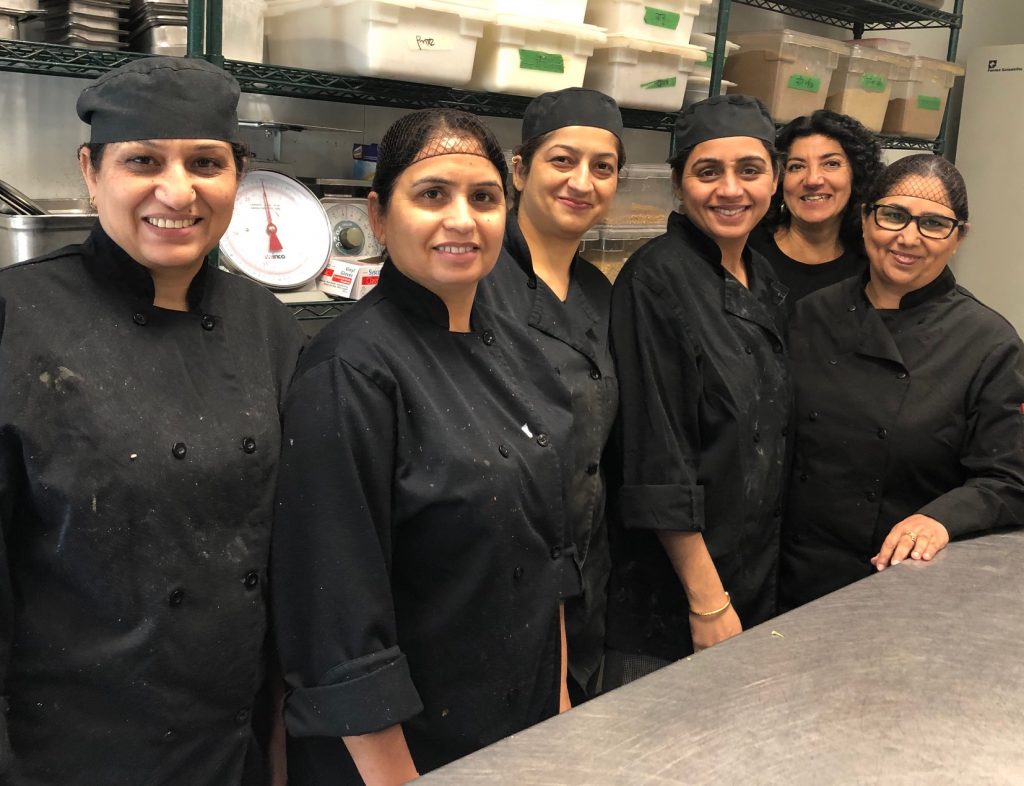
When the restaurant first opened in 1994 as a 14-seat space, Amarjeet Gill, whom Vij had met through a mutual acquaintance, was his part-time dishwasher. She had come to Canada in her 20s in a happy arranged marriage and spoke no English.
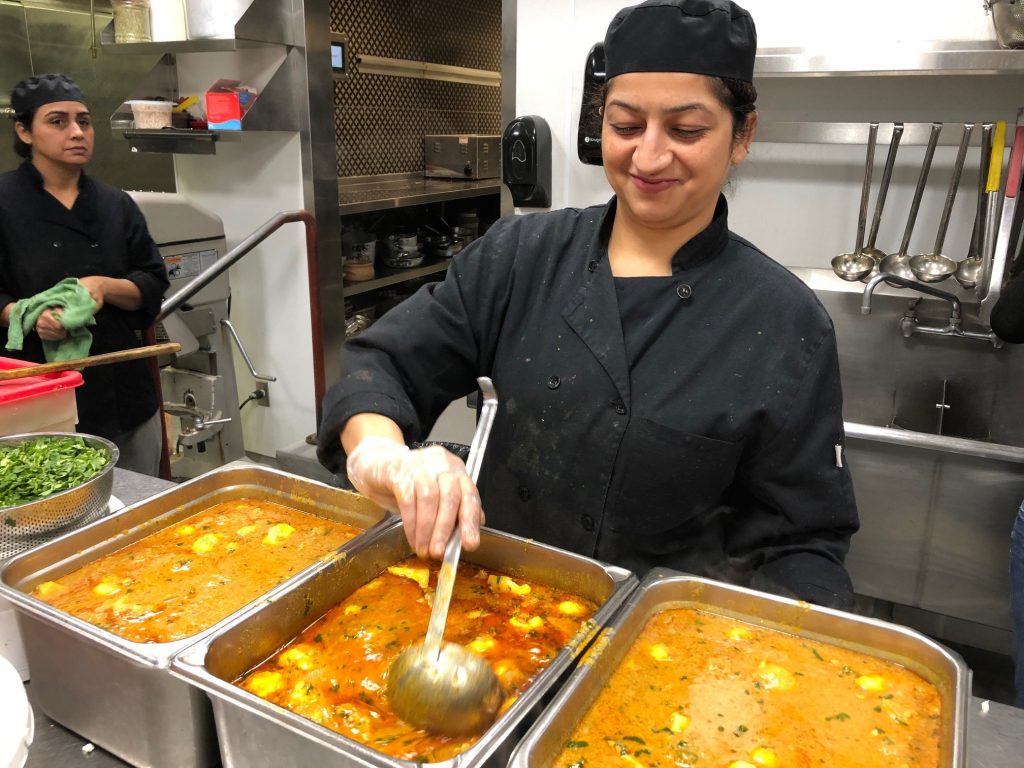
Within weeks, Gill was right by Dhalwala’s side, chopping, slicing, and stirring. She had never used a kitchen knife before. By the time Vij’s moved to its location at Granville Street and West 11th Avenue a year later, Gill had taken the helm of the kitchen, executing the menu items that Dhalwala developed as the team grew.
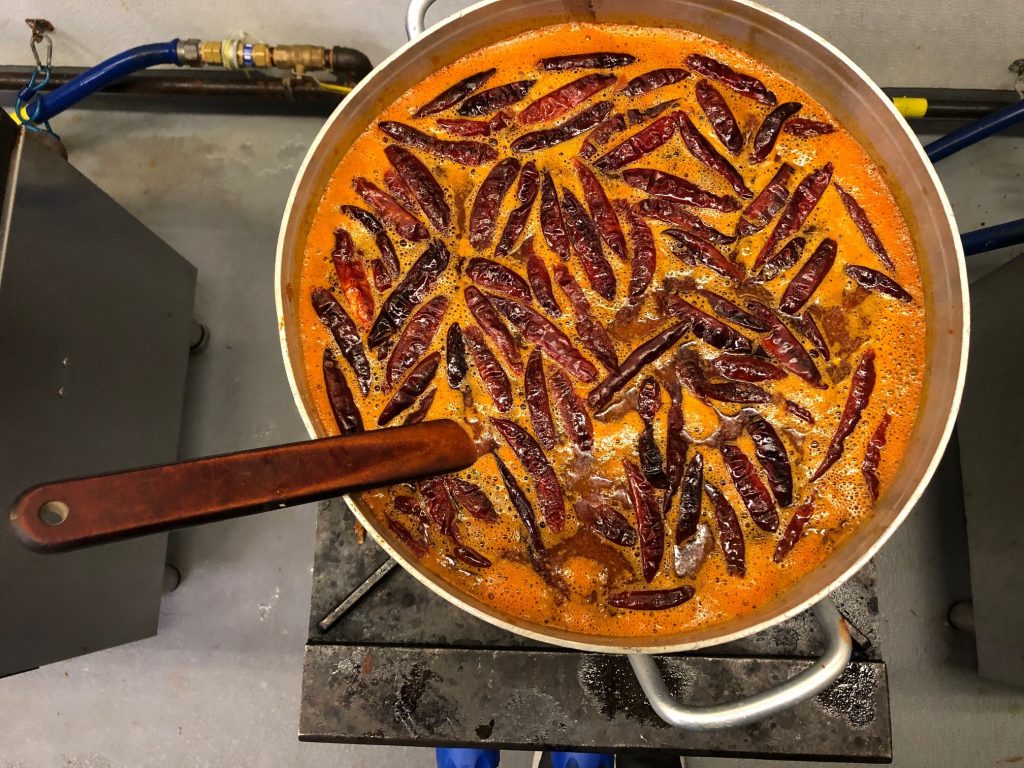
Vij’s has since moved to a larger home at Cambie and West 15th Avenue. (The more casual Vij’s Rangoli is at West 11th Avenue and Granville.) To this day, Gill still leads the kitchen staff. The team of chefs consists entirely of immigrants (like Vij and Dhalwala), all from the Punjab, and all women.
Many of the women have been with Vij’s for more than two decades. Dhalwala included, they have seen each other through births, deaths, illnesses, divorce, struggles, and joys. They’re a tight-knit team and even tighter family.
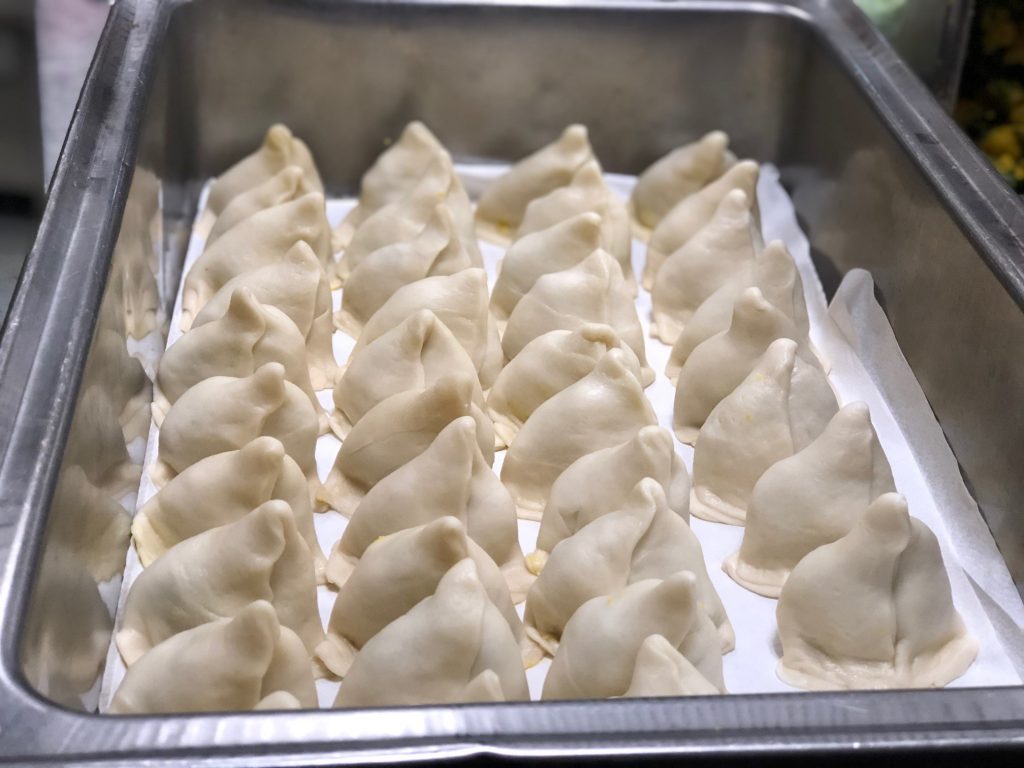
I got to spend a morning with some of the cooking crew, with Dhalwala translating. Here’s a glimpse into a day in the life at Vij’s kitchen, lively conversation included.
6 a.m: Shift starts.
Gill comes in from South Vancouver; Parmjit Sandhu, Sital Dale, Harjinder Munday, and Ravinder Cheema carpool from Surrey. The women don black long-sleeve cook jackets and hair nets or caps.
People on shift the night before have left a list of what needs to be made, right down to the chutneys. Onions—dozens and dozens of them—get chopped, and big bins of dry ingredients labelled in Punjabi come out: chili flakes, cumin, cardamom, turmeric, and fenugreek. Within the hour, half a dozen pots are bubbling gas burners. They’re prepping for that night and the next.
Gill oversees everything: ordering supplies and outlining what needs to be done. It quickly becomes clear that she has more than strong organizational skills; she’s a big sister to everyone.
“She literally has taught me how to have a heart and run a business,” Dhalwala says of Gill, whose kids are now 30 (a married son) and 24 (a daughter). “I would not be here if it were not for Amerjeet. Vikram and I give her all the credit.
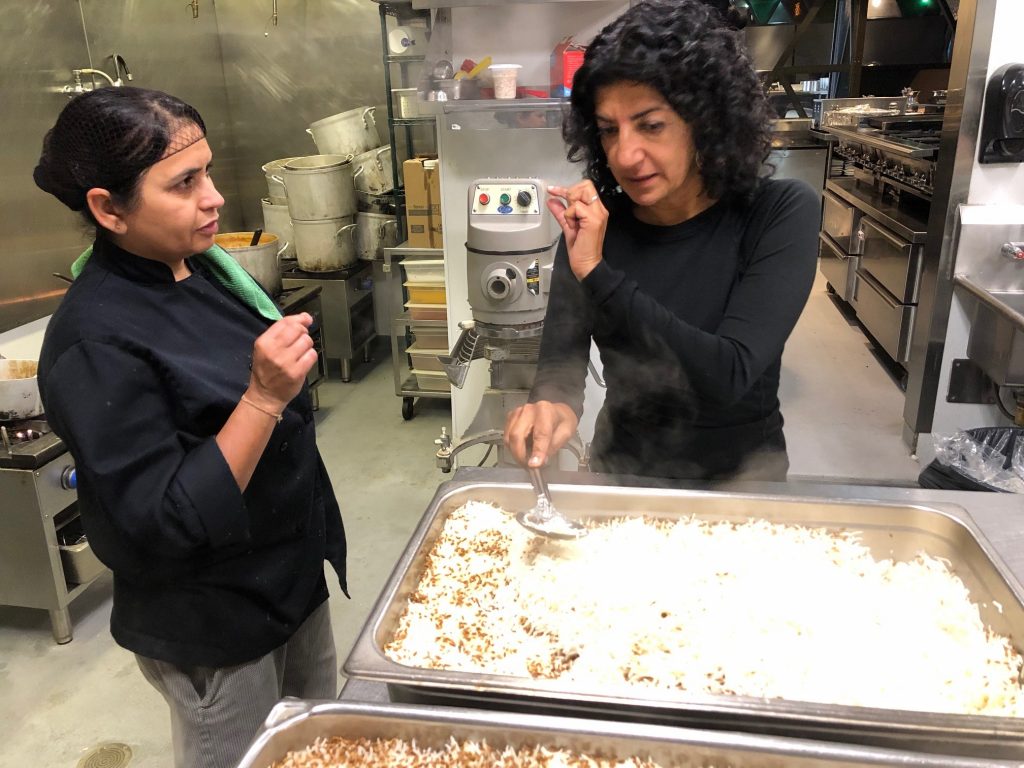
“In November 1994, when I walked in that door just to visit, she was just beaming at me. We couldn’t even speak the same language. She spoke only Punjabi and I spoke bits and pieces of Hindi. We just beamed at each other.
“I came up with [menu] ideas and she would start chopping and get everything going. I’d put up my hand and say ‘My idea is coming! My idea is coming!
“She runs the whole show. I have zero turnover because of her. If somebody’s having a really tough time in life, she will stick through it with them. She’s like that with everybody. She has never yelled.
“If someone needs to go back to India because someone in the family has died, they will pool their money together to buy the plane ticket. They will all pool whatever they’ve got—the entire staff. [Dhalwala contributes too.] It’s a donation; no one needs to get paid back.
“Amarjeet had her son in India. They to leave him in India when he was three while they settled here. They thought he would be way happier and safer with uncles, aunts, and grandparents in his village than with parents who were new immigrants in Canada looking for work. No one likes to be on welfare. It’s an insult. He was there for six years. I was here the day he came to Vancouver. He couldn’t speak any English. His first year at school was really, really, really hard. I know how the system works, so I got him ESL and extra ESL. When he was 16, we hired him at Rangoli. He bussed and cleared tables. He told me, ‘I love my mom the most out of any human in this world.’”
8 a.m.: Chai break
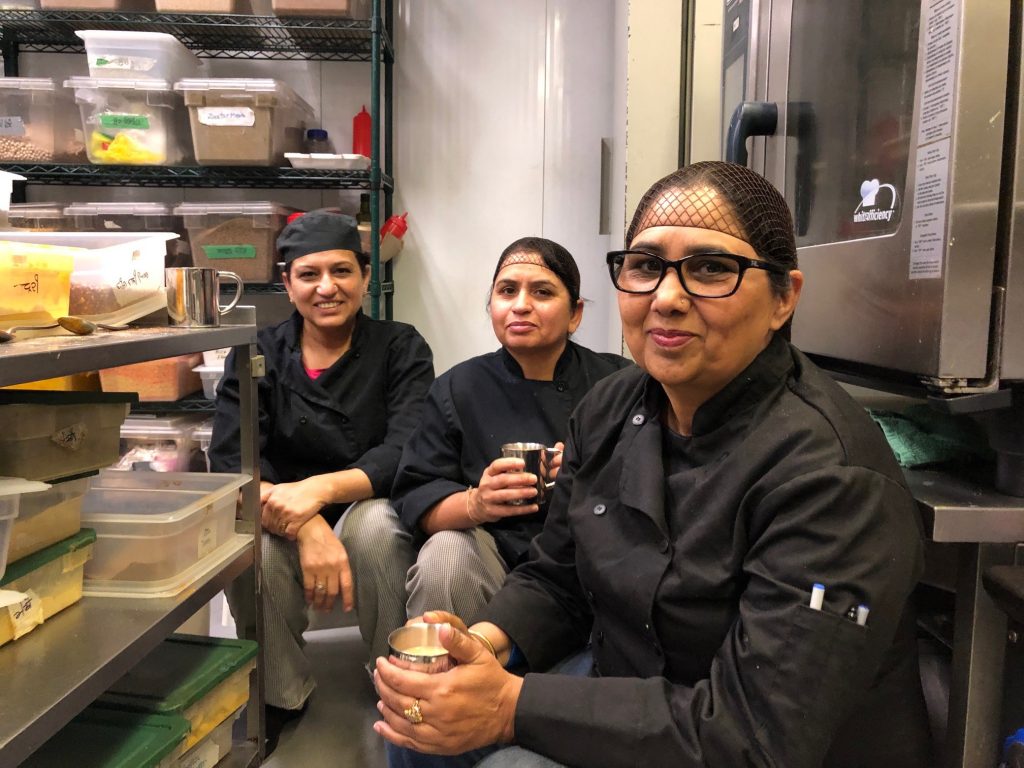
A pot of chai has been simmering all morning, and it’s time to pause. One of the women serves the Indian tea made with raw sugar into stainless steel mugs—there’s no glass in the kitchen—everyone grabs a little step stool to sit on in the middle of the kitchen.
“Chai was the first thing I made at Vij’s,” Dhalwala says. “How do you make a chai keep it in a pot so doesn’t get milky and thick but is light and flavourful? The chai that I serve at Vij’s is the village chai. Children get their calcium from it. Village tea is mostly milk. City tea is mostly water.”
The conversation flows. No topic is off limits.
Being a working mom in the restaurant industry comes up.
“Yes, you can be in the business with children; you need support. In our culture, it’s fine to leave your kids with your grandparents or aunties or uncles. There are joint houses. Amerjeet and her husband live with their son and his wife, in two separate households.
“This is where I had my therapy when Vikram and I split up.
“Vikram comes and cries if something is wrong.
“Ravinder’s nephew—he was 21—was killed by a truck on his way home from Squamish. In our culture, it’s one in the same after marriage. You can’t put a corporate-timed leave on that because of the trauma. There’s no pressure here to get back to work. You come back when you’re ready. There’s no pressure that anyone’s going to lose their job. We shuffle things around. We don’t care that we can all do each other’s job. There’s no competition here. Everybody will dish wash and everybody will cook.
“Everybody used to take the bus from Surrey to the old Vij’s. With the bus strike, that’s when carpools started to happen. One day, in one car, we had three day staff. The car got hit from behind. Three of them were out of commission, hospitalized. They were off for six weeks, two months. Night staff came in and everybody made it work.
“We talk about everything. We talk about sex. We talk about orgasms. We talk about women’s rights. If he’s not going down on you, you’re not going down on him. That is a basic, intimate rule of equality.
“We talk about atheism and Sikhism. We talk about abortion and pro-choice.
“Early on 15 years ago I asked who picks up their husbands shoes and underwear. I said, ‘We gotta stop that. You all have one month to wean your husbands off. No more picking up your husbands’ shoes and dirty underwear.’
“I was with Parmjit for the birth of her twins. I checked into BC Women’s with her and her husband. They needed an advocate. Her husband was really nervous. I stayed with them for about 18 hours then had to go home to get the girls ready for school. Then she popped.”
8:20/30 a.m. Back to work
More chop, chop, chopping. All of the produce comes from local farms.
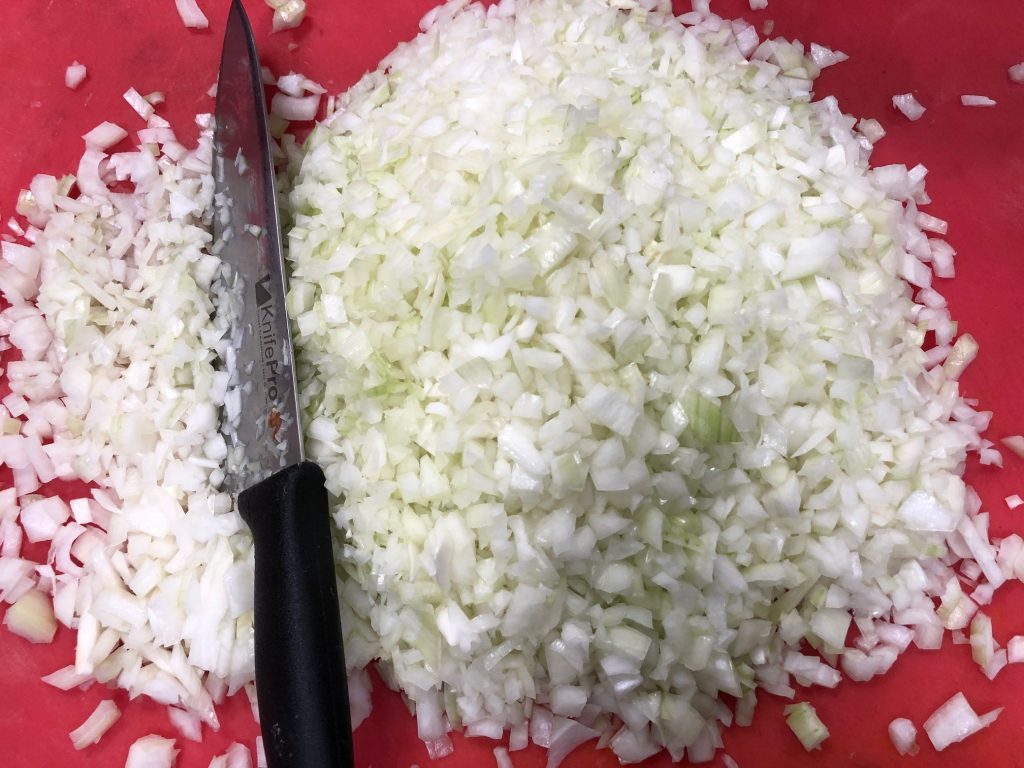
Pakoras are made by hand. Basmati rice is cooked. Chickpeas are stirred.
“After I come up with a dish, we remake it here,” Dhalwala says. “We make it five times. I do not know how to scale a recipe. I can make it for 10 people, maybe 15. But I lose my sense of spice balance when we have to make 100 orders. They do that.”
11/11:30 a.m.: Lunch
The women take turns making a family-style vegetarian meal. Each grabs a tray (the same kind that’s used at Sikh temples) made of stainless steel with individual compartments for yogurt, dahl, rice, and the main dish. They take a seat on the step stools on the kitchen floor, trays perched on their laps.
12/12:30 Back to work
Gill takes a bowl of just-cooked goat meat to another section of the kitchen, sits on a step stool, and starts pulling the meat from the bones with her gloved hands. The bones are used to make stock. The goat meat goes into curries.
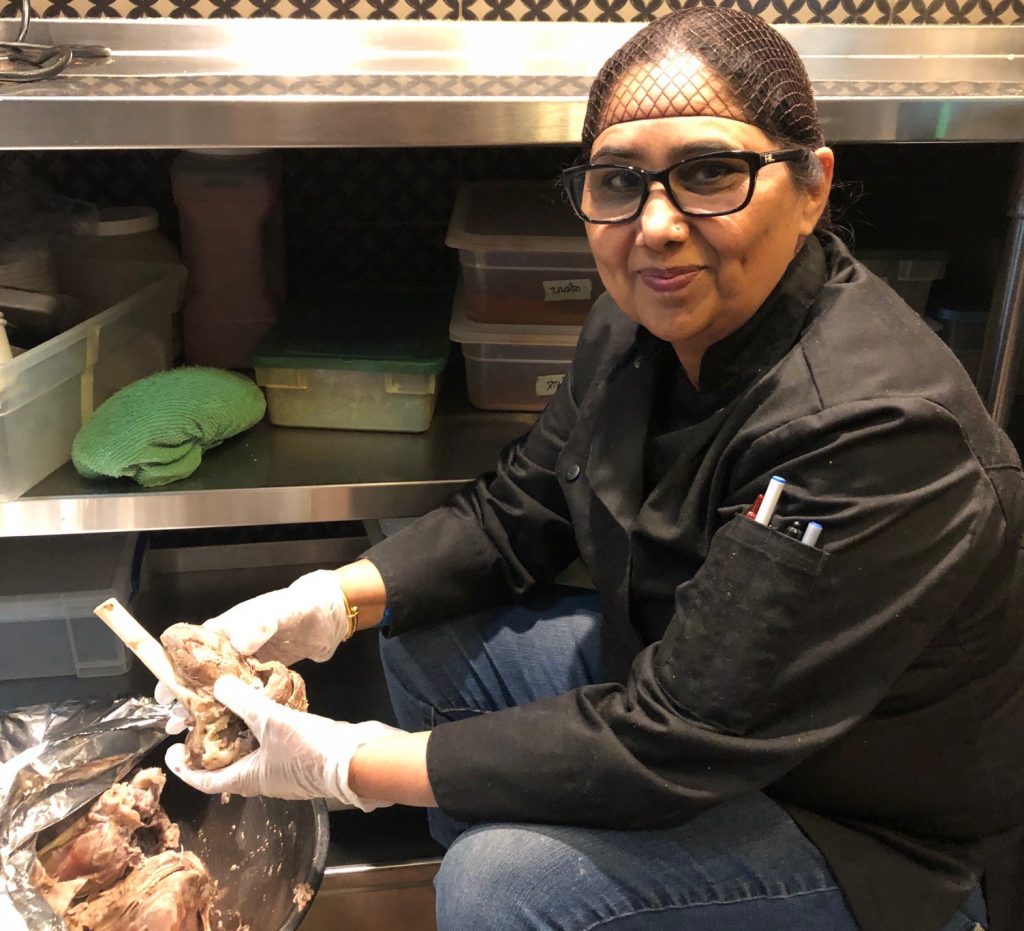
“During her first year, she would take the meat off with a knife; all of the women are vegetarian by choice,” Dhalwala says. “She’d take a deep breath and say ‘Dear God, please forgive me, I am doing this for my family.’
“Now, nothing pleases her more than taking the goat meat off. That’s where she does all her thinking. There is a seat next to her; it’s empty. This is very important, if we need counsel, we sit right there. If anything is wrong, if there are any issues; this is where we go. The doctor is in. She does kick me off sometimes.
“If there are arguments between any of the women, they get the silent treatment for about an hour. But then they get really bored. It’s not fun.
“Two of the women carpool together. One day one got mad because she felt she was driving more than the other. They got into a big fight before they even opened the door. They spent the whole day not talking to each other. It was the biggest fight they’ve ever had. They had to ride home together. Both of them burst into tears in the car on the way back. They hugged each other then had tea together.
“They say we have so much fun that we actually don’t even like our two days off because we don’t see each other and we miss each other.”
2:30 p.m. Shift ends.
Vij’s is located at 3106 Cambie St, a 12 minute walk from Broadway-City Hall SkyTrain Station.

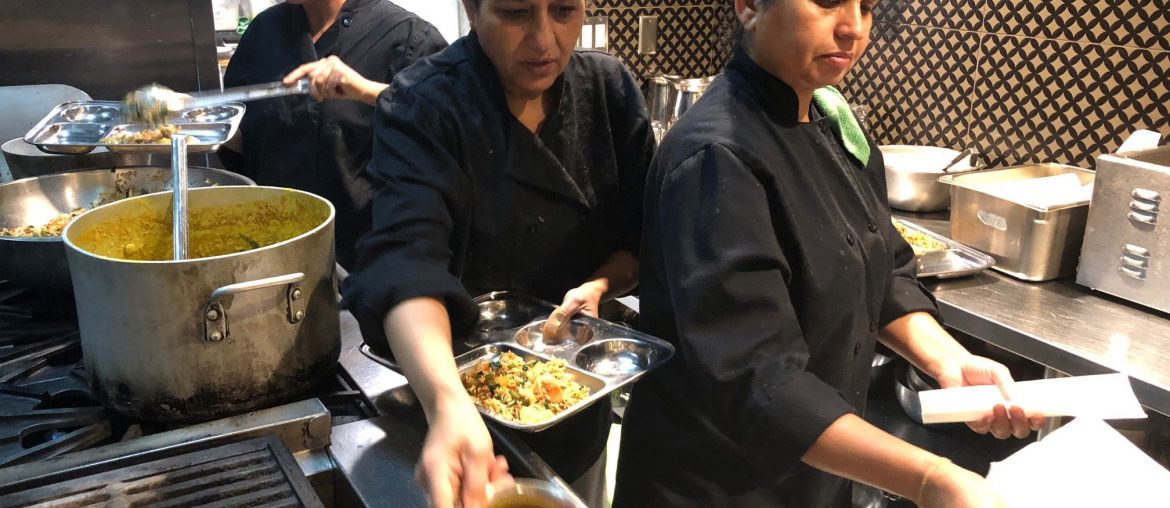
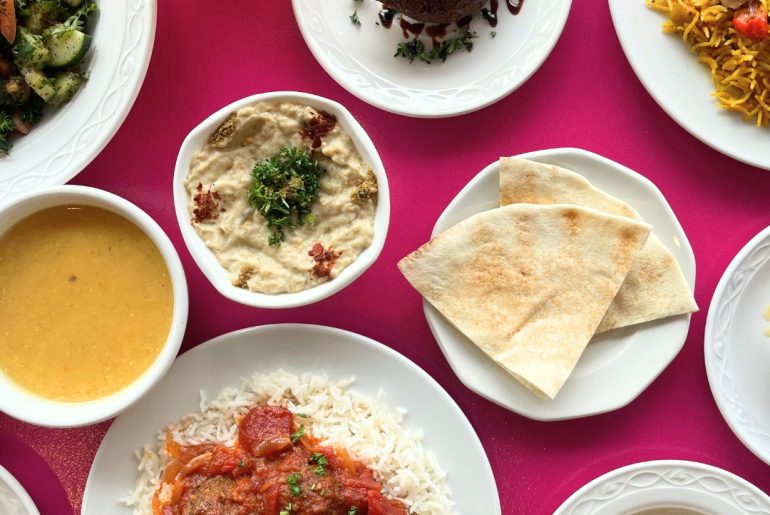

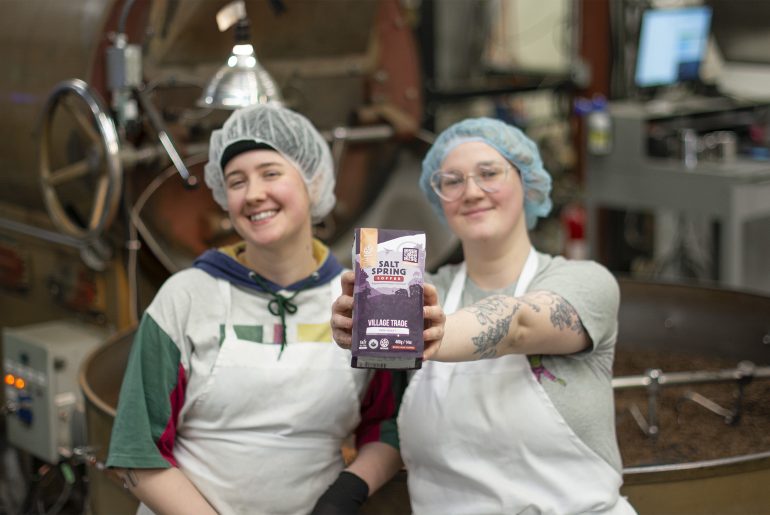
Comments are closed.